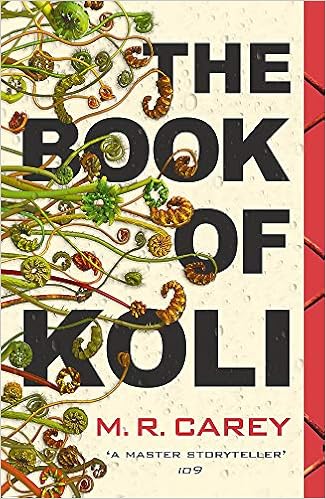Things we want to eat fight back, hard as they can, and oftentimes win. Things that want to eat us is thousands strong, so many of them that we only got names for the ones that live closest to us. [p. 13]
The Book of Koli is set in a future Britain that's been ravaged by climate change and ill-advised genetic tinkering. Koli is fifteen, and lives in the village of Mythen Rood, which relies on Ramparts -- villagers who can activate and operate the few surviving pieces of tech -- to protect the inhabitants against the many and varied threats outside the walls. Out there, Koli knows, are carnivorous trees (nobody leaves the village on a sunny day, when the trees are at their most mobile) as well as genetically-engineered wildlife and the infamous Shunned Men, outcasts who are rumoured to feast on human flesh.
So obviously Koli wants to be a Rampart when he grows up, and to this end he steals a bit of tech from the locked cellars of the Ramparts' house. This tech isn't a laser-cutter or a weapon, though: it's a media player with an integrated AI named Monono Aware (origin of the name) who is a self-described 'manic pixie dream girl in a box', and a thoroughly delightful character. However, Koli's theft of the media player -- which he reveals to the other villagers by having her play music ('Never Gonna Give You Up', in fact) at the wedding of his former best friend to the girl Koli likes -- is grounds for banishment from Mythen Rood.
Luckily Koli has an ally in the wandering healer Dam Ursala, who travels with a medical drone, likes a drink, tells stories of London and other semi-mythical places, and is generally fearsome. She's also rather more pragmatic than Koli, but the two come to rely upon each other.
I especially liked Koli's very distinctive voice here: it reminded me of the imaginary future dialect in Russell Hoban's Ridley Walker, though with a Yorkshire rather than a Kent accent and not nearly as distant a future. (While it's not clear just how far in the future The Book of Koli is set, the recognisable survivals from our own time indicate that it's more likely a couple of centuries than a couple of millennia.) Ursala and Monono have different accents or ways of speaking, as do the other folk that Koli encounters over the course of the novel, which adds to the richness of the world Koli inhabits.
Though the initial chapters have a pleasingly medieval feel, there is plenty outside the walls of Mythen Rood to challenge Koli's preconceptions. It is not only, literally, a jungle out there: there are other threats, human and otherwise, to Koli and Ursala, and even to Monono.
Koli's a very credible teenaged boy, trying to be grown up but also very aware that he's at the mercy of hormones and ignorance. By the end of the novel -- the first in a trilogy, of which the second is now available and the third due in March 2021 -- his childhood illusions (and his faith in the Ramparts) have crumbled, and he understands a little more of the wider world in which he lives, and the factors that threaten the future of the people of Britain. I'm looking forward to reading the rest of the trilogy, though I'll likely wait until the third book has been published.

No comments:
Post a Comment